Whether math is invented or discovered is actually still a debated question in mathematics.
- 10 Posts
- 903 Comments

 1·1 year ago
1·1 year agoThat it could be an incitement to violence is precisely what they will/have argue(d), I would guess.
It’s only a non-justicable political question when Republicans do it. That part is written in invisible ink, which is only visible if you sign your entity’s legal name diagonally across the written decision with a red pen.

 4·1 year ago
4·1 year agoAgreed. A more granular map would be interesting to see. I mean, something like 65% of NY state’s population live in the NYC metro, which is a tiny part of a deceptively large state.
Re: Colorado, it’s just a relatively healthy state with a general ethos of living well. I think you’re seeing some of the urban effect through the Denver, Colorado Springs, etc. and the addition of rural areas of Colorado still having an outdoorsy culture, as well as (often) affluent rather than “rural poor.” Colorado has one of the lowest rural poverty rates in the United States.
And since Colorado would be in the 25-29.9 category now, it’s comparable to many states that also have comparable rural poverty rates. The fact that the states with the highest rural poverty also have the highest weights makes me assume obesity rates and poverty rates heavily overlap.
Edit: to the point, look at the county map for childhood obesity. You can literally point out almost every major city in the United States.


 2·1 year ago
2·1 year agoLol it did a pretty good job. I was hoping someone would finish it.

 21·1 year ago
21·1 year agoSo three North Americans walk into a bar at the top of the mountain.
The first guy walks up to the bartender and says, "

 221·1 year ago
221·1 year agoIs it possible they’re expressing admiration or paying you a compliment and not trying to invoke your smirking condescension?
Incidentally, according to the most recent CDC numbers, Colorado is no longer “green” on this map, just Hawaii and DC.
There’s only eight states under 30%. West Virgina tops the numbers at 41%.
~75% of the United States is classified as overweight or obese, which is staggering. It has to be pretty unevenly distributed even within states, because I live in a college town in a low-middle-weight state, and very few appear obese, and I’m regularly in a nearby major metro, and I don’t see a ton of obese people there either. Rural children are 10-15 times more likely to obese, so I’m guessing that is probably a major factor as well.
25-35% obesity rates covers like 80% of states, so the US is just fat and getting fatter.

 1·1 year ago
1·1 year agoState actors expend resources that have no effect all the time. Wanting to have an effect and actually having the desired effect are two different things, as I’m sure you know from your own life.

 28·1 year ago
28·1 year ago“Open the door to corruption”? 🤣🤣🤣🤣🤣🤣

 3·1 year ago
3·1 year agoNarrator: it didn’t.

 29·1 year ago
29·1 year agoI think it’s more like he felt like Republicans were more likely to punish his child for daring to be themselves and Grimes for daring to leave him. He’s got big divorced-guy vibes.

 27·1 year ago
27·1 year agoIf you’re alive you’re connected to all things and everything indirectly. Also if you’re dead.
This person posted this earlier today then deleted it when people started pointing out how gross it is. It’s all they’ve posted about.
Indulging this person’s fetish that they’re facilitating by using an LLM isn’t a great idea. You’re enabling someone who is probably in mental distress, and you’re spending way more time on it than they are. He’s just throwing responses into an LLM and copying the response over, and he’s indulging in the attention. This account is literally only this post and comments.
It’s creepy to think of some low-effort sweat slobbering over the attention from those willing to indulge his AI-constructed fanfic. Gross.

 6·1 year ago
6·1 year agoLol that’s incredible. Never seen it before, thanks.

 391·1 year ago
391·1 year agoSounds accurate. He thinks things work like 80s action movies. He probably literally got mad when they told him Rambo was a fictional character, so they had to force some guy to legally change his name to Rambo so Trump would be happy.
The idea that you can just “send” “special forces” “assassins” to kill cartel leaders in a foreign country is fairly challenging just as an accomplishsble mission, let alone factoring in the potential and very serious blowback from the cartels AND the Mexican government.
$20 says he recently watched Sicario or something.

 1·1 year ago
1·1 year agoI understand what you’re saying. I’m just saying it’s relevant because the article and underlying research article are ultimately about increased volcanic activity at the site of a supervolcano. The purpose of their research was to establish what was underlying volcanic activity that might indicate an eruption from other cause of emissions.
Also, noting how destructive supervolcanoes would hypothetically be is relevant just because it’s crazy.

 1·1 year ago
1·1 year agoIt’s talking about how those small-scale emissions indicate higher risk of super-volcanic eruption, which is the part of the topic of the third section of the article and is the implicit concern throughout the article.
In fact, the entire point of the article is to discuss how analyzing these emissions can be used to determine if it’s simply the “dissolution of calcite in the surrounding rocks” or if it is “traced back to underground magma,” allowing geologists to determine if volcanic activity and eruption risk is increasing. This data was used to raise the “warning level” of the area from green to yellow.

 1·1 year ago
1·1 year agoYeah, it would mostly be the sulfur and volcanic winter. And the famine.
The article is talking about supervolcanoes, and you’re talking about regular volcanic eruptions. I’m clarifying the difference in magnitude.

 3·1 year ago
3·1 year agoI don’t think you’re accounting for the massive difference in scale when considering a super-volcanic eruption. It would cause global famine and a massive die-off of most species including humans. If Yellowstone went off, for instance, we would be living under volcanic winter for at least a decade. It would release something like 1,000 gigatons of CO2, which would be roughly equivalent to all human caused CO2 since the industrial revolution, and it would do it all at once.
By way of example, the Toba supervolcano was so devastating and caused so much death it literally created a pronounced genetic bottleneck in the history of human genome.




Hey babe, wake up. A new human-created, extinction-level event just dropped.